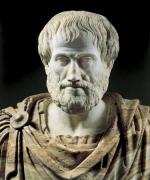|
This section contains 3,072 words (approx. 11 pages at 300 words per page) |

|
Aristotle (384–322 B.C.E.), born at Stagira, in northern Greece, was a philosopher and scientist, and a student of Plato (c. 428–c. 348 B.C.E.). The range and depth of Aristotle's thought is unsurpassed. He wrote on logic, physics and metaphysics, astronomy, politics and ethics, and literary criticism. His work formed the backbone of much Islamic and late medieval philosophy. In the early 2000s he is taken seriously as a social scientist and philosopher of biology. On a number of levels his thought is significant for science, technology, and ethics.
Basic Concepts
The root of Aristotle's thought lies in his response to the central puzzle of ancient Greek philosophy. For something to come to be, it must come either from what it is or from what it is not. But it cannot come from what it is, for what already exists cannot come to...
|
This section contains 3,072 words (approx. 11 pages at 300 words per page) |

|


